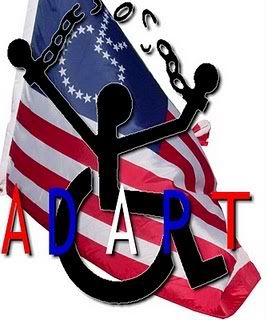A side of the Wisconsin Protests not many have heard
It is small as protests go these days in Madison. A line of advocates, activists, and people with disabilities, some in wheelchairs, maneuvers its way through the slush Thursday, past honking horns and over puddles, from Capitol Square to a squat, nondescript office building at 149 E. Johnson. "Our homes, not nursing homes!" the protesters shout. Bringing up the rear on crutches, his right leg amputated below his knee, is John Nousaine. He has driven down from Superior to join this mission.The line of 25 or so protesters closes in on its target: the state Republican Party headquarters. While an advocate holds the door open, a stream of motorized wheelchairs twists, turns, bumps and backs its way through the building's narrow halls until it comes to a halt in a small lobby right outside the office of the party's startled executive director, Mark Jefferson. A few protesters and a service dog roll right on in to Jefferson's office, past several glass and brass elephants and an autographed Badgers football, and up to his desk."What's this about?" he asks."It is about our lives!" says Dane County Board Supervisor Barbara Vedder, who was paralyzed in a car crash years ago and gets around in a wheelchair.It is around noon Thursday, the start to what will be a two-hour occupation of the state GOP headquarters, the latest salvo in a battle by advocacy groups to get word out about Medicaid provisions buried in Gov. Scott Walker's budget repair bill that would, they say, allow his administration to gut the public health programs many of them depend on.It is also a kind of protest that Madison has not yet seen. Over the past two weeks there have been all kinds of demonstrations in the Capitol. Firefighters have marched with bagpipes. Family doctors have written medical excuses from street corners. Break dancers have slammed the marble in the Rotunda. Yoga instructors have greeted dawn with chants. Children have brought their stuffed animals and sleeping bags to the statehouse for sleepovers. But nobody had ever just marched right into the GOP headquarters and tried to take over, Jefferson says.Activists tell him they are there because they are desperate.They believe that changes to Medicaid programs in the bill, including provisions that will hand unprededented powers to the Walker administration to circumvent state laws and normal legislative processes in revamping the public health plans, could lead to cuts in their benefits that will force many of them back into the institutions that once housed most people with disabilities. And they don't intend to let that happen without a fight."Are you even aware of the MA provisions in the bill?" Vedder asks. "We are able to be in our home with jobs and be productive members of society because of Medicaid. We don't want to be put into nursing homes. This budget bill is not repairing us. It is destroying us!"Jefferson asks what that has to do with him. "I'm just an operative," he says. Protesters explain they won't leave until he arranges a face-to-face meeting with Walker. Jefferson says that the Governor is too busy. "It's a very trying time up there," he explains to the crowd. "He's in the middle of a budget crisis.""We're in the middle of a life crisis!" Vedder replies.Organizers working for Wisconsin ADAPT and Southeastern Wisconsin ADAPT, twin activist organizations devoted to keeping people with disabilities out of institutions, had been secretly plotting the surprise takeover for several days in hopes that their action could finally grab the spotlight for people with disabilities and on Medicaid, whose plight has been largely overshadowed by debate over labor issues. "We're not leaving until we get something!" several in the group shout."What you've got is an ear," Jefferson says. "We haven't allowed folks to just come in and take over before without an appointment.""Thank you. That's real sweet," mutters Roxan Perez of Milwaukee, who needs to use a motorized scooter to get around because she has multiple sclerosis.Over the next hour or so, the two sides try to listen to each other. Several of the protesters tell Jefferson why they think cuts in Medicaid would hurt them. His response is to say that the bill, by getting rid of collective bargaining, would "free up local governments to prevent some of these cuts from happening." The crowd doesn't buy it. "Why are you pitting people against each other! That's crazy! That's bull----" says Jerome Holzbauer, a Milwaukee retired school teacher who has earned a Ph.D in rehab psychology and has cerebral palsy. "You're going after the most vulnerable!"A woman asks how Jefferson and the Republicans and others with wealth are "sharing the pain.""This has a lot of people on the public dime," he says, gesturing to the crowd in his office. On the other hand, he works in the private sector, he says, which is also hurt by the economy because "we have to rely on fundraising to keep our doors open."Jackie Turner asks how he justifies policy changes in the bill that would hand the Walker administration the power to make unilateral decisions about Medicaid programs, eliminating lawmakers and people like her from the process. "How could you support something that doesn't require legislative and public input?" asks Turner, who lives in Monroe in Green County and has been a paraplegic since a car accident left her in a wheelchair decades ago. "How can you support that? Please answer that!"Jefferson replies that he understands that "department bureaucrats making cuts gets people upset," but that the provision has precedent: the Department of Natural Resources has initiated similar rule changes. "DNR is animals, fish, squirrels. We are humans! Do you understand the difference? Yes or no?" says Joe Kunz of Madison, who has muscular dystrophy, from his wheelchair.The protesters are determined to speak, though for several speech is difficult. John Donnelly has cerebral palsy, and his face twists with effort as he tells a reporter why he has come in his wheelchair to the protest. He depends on Medicaid benefits, his friends help explain, to participate in community based programs and to live in his own apartment, with home aides who help. It takes several seconds for Donnelly to get each word out, but he does not give up. "I'll ... die ... before... I go... into one of those facilities!" he finally says.
I went to my local MoveOn rally today in Annapolis with two other Maryland ADAPTers. Anyone else go to one?

















0 comments:
Post a Comment